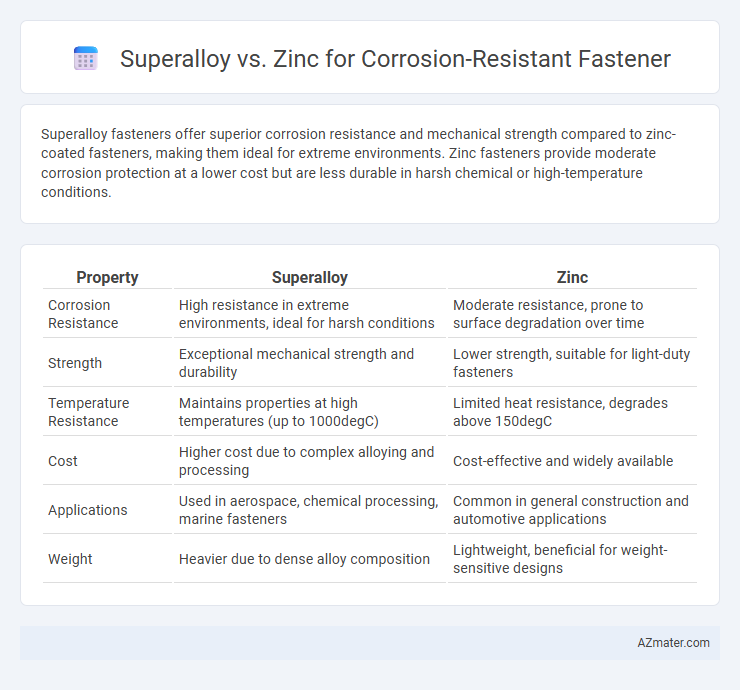Superalloy fasteners offer superior corrosion resistance and mechanical strength compared to zinc-coated fasteners, making them ideal for extreme environments. Zinc fasteners provide moderate corrosion protection at a lower cost but are less durable in harsh chemical or high-temperature conditions.
Table of Comparison
| Property | Superalloy | Zinc |
|---|---|---|
| Corrosion Resistance | High resistance in extreme environments, ideal for harsh conditions | Moderate resistance, prone to surface degradation over time |
| Strength | Exceptional mechanical strength and durability | Lower strength, suitable for light-duty fasteners |
| Temperature Resistance | Maintains properties at high temperatures (up to 1000degC) | Limited heat resistance, degrades above 150degC |
| Cost | Higher cost due to complex alloying and processing | Cost-effective and widely available |
| Applications | Used in aerospace, chemical processing, marine fasteners | Common in general construction and automotive applications |
| Weight | Heavier due to dense alloy composition | Lightweight, beneficial for weight-sensitive designs |
Introduction to Corrosion-Resistant Fasteners
Corrosion-resistant fasteners are engineered to withstand harsh environmental conditions, preventing rust and material degradation over time. Superalloys, composed primarily of nickel, cobalt, and iron, exhibit exceptional resistance to high-temperature oxidation and chemical corrosion, making them ideal for demanding industrial applications. Zinc fasteners offer cost-effective surface protection by forming a stable oxide layer that guards against moisture and corrosive agents, suitable for general-purpose use in less aggressive environments.
Understanding Superalloys: Composition and Properties
Superalloys, primarily composed of nickel, cobalt, and iron, exhibit exceptional corrosion resistance and high-temperature strength, making them ideal for fasteners in extreme environments. Their complex alloying elements, such as chromium, aluminum, and titanium, form stable oxide layers that protect against oxidation and chemical degradation. Compared to zinc-coated fasteners, superalloy fasteners provide superior durability and lifespan in corrosive applications like aerospace and chemical processing.
Overview of Zinc as a Fastener Material
Zinc fasteners are prized for their excellent corrosion resistance, affordability, and natural ability to form a protective oxide layer that prevents rust. Widely used in outdoor and marine environments, zinc coatings on steel fasteners enhance durability by shielding the underlying metal from moisture and chemical exposure. Their lightweight nature and ease of manufacturing make zinc fasteners a preferred choice for applications requiring moderate strength with effective corrosion protection.
Corrosion Resistance: Superalloy vs Zinc
Superalloy fasteners exhibit superior corrosion resistance compared to zinc fasteners due to their high-performance metal matrix, often containing nickel, cobalt, and chromium, which form a stable, protective oxide layer under harsh environmental conditions. Zinc fasteners, while offering sacrificial corrosion protection through galvanic action, are prone to degradation in acidic or chloride-rich environments, leading to shorter service life in marine or industrial applications. The enhanced corrosion resistance of superalloy fasteners makes them ideal for aerospace, chemical processing, and marine industries where long-term durability is critical.
Mechanical Strength Comparison
Superalloys exhibit significantly higher mechanical strength compared to zinc, making them ideal for high-stress, corrosion-resistant fasteners used in aerospace and marine applications. While zinc fasteners offer moderate strength and are primarily valued for their corrosion resistance through sacrificial protection, they cannot match the tensile and yield strength of superalloy counterparts. The superior mechanical durability of superalloys extends fastener lifespan under extreme loads and aggressive environments, where zinc fasteners may experience deformation or premature failure.
Longevity and Durability in Harsh Environments
Superalloy fasteners exhibit superior longevity and durability in harsh environments due to their exceptional resistance to high temperatures, oxidation, and mechanical stress, outperforming zinc fasteners that are prone to corrosion and degradation over time. The intrinsic alloying elements in superalloys, such as nickel and chromium, provide robust protection against chemical attack and wear, ensuring structural integrity in extreme marine, aerospace, and industrial applications. Zinc-coated fasteners offer initial corrosion resistance but lack the long-term toughness and high-temperature stability essential for demanding conditions.
Cost Analysis: Superalloy vs Zinc Fasteners
Superalloy fasteners offer superior corrosion resistance and mechanical strength but come with significantly higher material and manufacturing costs compared to zinc fasteners. Zinc fasteners provide a cost-effective solution with moderate corrosion resistance suitable for less demanding environments, making them ideal for budget-sensitive projects. The choice between superalloy and zinc fasteners hinges on balancing initial expenses against long-term durability and maintenance savings.
Application Suitability for Different Industries
Superalloys exhibit superior corrosion resistance and mechanical strength, making them ideal for aerospace, marine, and chemical processing industries where extreme environments demand high durability. Zinc-coated fasteners, while more cost-effective, offer sufficient corrosion protection for construction, automotive, and household applications subjected to moderate weathering conditions. Selecting between superalloy and zinc depends on environmental exposure, mechanical stress, and budget constraints inherent to each industry's operational requirements.
Environmental Impact and Sustainability Considerations
Superalloy fasteners offer superior corrosion resistance and longer lifespan, reducing the frequency of replacements and minimizing material waste in harsh environments. Zinc coatings, while effective in preventing corrosion initially, may degrade faster, leading to more frequent maintenance and potential environmental contamination from zinc runoff. Selecting superalloy fasteners supports sustainability by lowering resource consumption and environmental pollution compared to conventional zinc-plated options.
Choosing the Right Material: Key Takeaways
Superalloy fasteners offer exceptional corrosion resistance in high-temperature and harsh chemical environments, making them ideal for aerospace, marine, and industrial applications requiring durability and strength. Zinc-coated fasteners provide cost-effective corrosion protection in mild environments but are less suitable for extreme conditions due to potential zinc layer degradation. Selecting the right material depends on environmental exposure, mechanical stress, and budget, with superalloys preferred for long-term performance and zinc coatings favored for economical, moderate-use scenarios.

Infographic: Superalloy vs Zinc for Corrosion-Resistant Fastener
 azmater.com
azmater.com